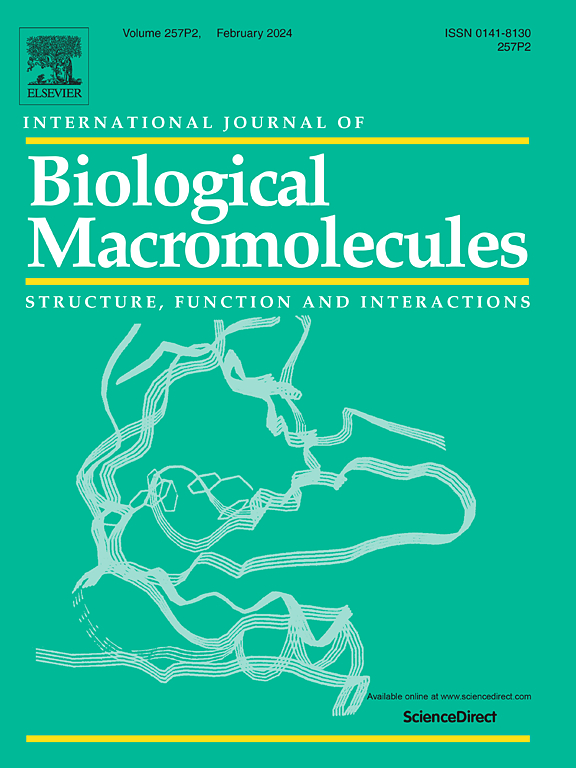Degradation of pectin with probiotic candidate Bacillus subtilis HA1 to oligosaccharides with enhanced anticancer and antioxidant properties
IF 8.5
1区 化学
Q1 BIOCHEMISTRY & MOLECULAR BIOLOGY
International Journal of Biological Macromolecules
Pub Date : 2025-10-22
DOI:10.1016/j.ijbiomac.2025.148501
引用次数: 0
Abstract
Upcycling fruit waste into health-promoting ingredients is an urgent sustainability challenge. In this work, a microbial degradation is described that converts apple pectin into bioactive pectic oligosaccharides (POS) using Bacillus subtilis HA1, a strain isolated from traditional yogurt. HA1 is γ-hemolytic, lecithinase-negative, and free of nhe/hbl enterotoxin genes, yet endures acid/bile and adheres to intestinal cells, confirming its safety and probiotic aptitude. The bacterium cleaves pectin within 6 h of incubation, and under optimum conditions (50 °C, pH 6), the extracellular pectinase showed a maximum activity of ≈18 IU/mL. TLC, LC–ESI–MS, and FTIR verify the formation of low-methylated mono- to tri-galacturonic acids. Crude POS scavenge up to 90 % of DPPH radicals at 10 mg/mL, which is five-fold higher than untreated pectin. POS also act selectively against tumor cells: MCF-7 breast cancer viability drops to 17 %, while healthy L-929 and HUVEC cells remain ≥95 % viable. Flow cytometry and qRT-PCR confirm apoptosis via Bax up-regulation and galectin-3 suppression. Altogether, probiotic candidate strains belonging to the B. subtilis afford a safe, eco-friendly route to high-value POS with potent antioxidant and anticancer activities, opening avenues for functional foods, nutraceuticals, and sustainable pectin valorization.
候选益生菌枯草芽孢杆菌HA1降解果胶生成具有增强抗癌和抗氧化性能的低聚糖
将水果废料升级为促进健康的原料是一项紧迫的可持续性挑战。在这项工作中,描述了利用从传统酸奶中分离的枯草芽孢杆菌HA1菌株将苹果果胶转化为生物活性果胶寡糖(POS)的微生物降解。HA1是γ-溶血,卵磷脂酶阴性,不含nhe/hbl肠毒素基因,但耐酸/胆汁并粘附在肠细胞上,证实了其安全性和益生菌性。在最佳条件(50℃,pH 6)下,胞外果胶酶的最大活性为≈18 IU/mL。TLC, LC-ESI-MS和FTIR验证了低甲基化的单至三半乳糖醛酸的形成。在10 mg/mL的浓度下,粗果胶对DPPH自由基的清除率高达90%,是未处理果胶的5倍。POS也选择性地对肿瘤细胞起作用:MCF-7乳腺癌的存活率降至17%,而健康的L-929和HUVEC细胞仍保持≥95%的存活率。流式细胞术和qRT-PCR证实Bax上调和半凝集素-3抑制导致细胞凋亡。总之,属于枯草芽孢杆菌的益生菌候选菌株提供了一条安全、环保的途径,具有强大的抗氧化和抗癌活性,为功能食品、营养食品和可持续果胶增值开辟了道路。
本文章由计算机程序翻译,如有差异,请以英文原文为准。
求助全文
约1分钟内获得全文
求助全文
来源期刊
CiteScore
13.70
自引率
9.80%
发文量
2728
审稿时长
64 days
期刊介绍:
The International Journal of Biological Macromolecules is a well-established international journal dedicated to research on the chemical and biological aspects of natural macromolecules. Focusing on proteins, macromolecular carbohydrates, glycoproteins, proteoglycans, lignins, biological poly-acids, and nucleic acids, the journal presents the latest findings in molecular structure, properties, biological activities, interactions, modifications, and functional properties. Papers must offer new and novel insights, encompassing related model systems, structural conformational studies, theoretical developments, and analytical techniques. Each paper is required to primarily focus on at least one named biological macromolecule, reflected in the title, abstract, and text.

 求助内容:
求助内容: 应助结果提醒方式:
应助结果提醒方式:


